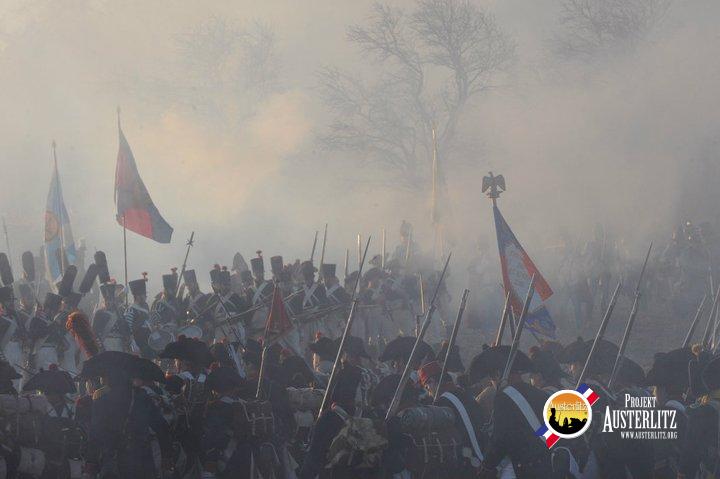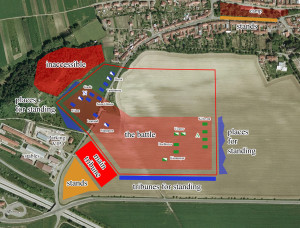210th ANNIVERSARY OF THE BATTLE OF AUSTERLITZ
AUSTERLITZ 2015
5th – 6th december 2015
TVAROŽNÁ, PRACE AND THE AUSTERLITZ BATTLEFIELD
We prepare the 210th anniversary of the battle of Austerlitz (2nd december 1805), the battle of the three emperors. In june 2015 the largest napoleonic re-enactment event in Europe has been held in Waterloo and the period of bicentenaries of the coalition wars of 1792-1815 culminated, and the with it the decade of napoleonic bicentenaries which was started back in 2005 with the 200th anniversary of Austerlitz and it’s 3600 participants from 24 countries of the world. We present the program of Austerlitz 2015, a sort of epilogue to the large napoleonic anniversaries.
Facebook profile of the event.

The Austerlitz 2015 event is being organized by the Project Austerlitz, Central European Napoleonic Society, the communes Tvarozna and Prace and the museum of the Old post of Pozoritz, with financial support by the South-Moravian Region, and under the auspices of the minister of defense of the Czech republic, Mr. Martin Stropnicky, minister of the regional developement, Mrs. Karla Slechtova, and governor of the South-Moravian Region, Mr. Michal Hasek. The event is supported by the ministry of defense of the Czech republic and by the CzechTourism agency.
The important anniversary of Austerlitz in 2015 will be the last event of the year and an eplogue to the long line of events that was started in 1992 by the bicentenary of Valmy, followed by Lodi or Arcole in 1996, Rivoli in 1997, occupation of Malta in 1998, Marengo as the first large bicentenary in 2000, and after a series of preceding events, that might possibly be taken as our camp of Boulogne, the bicentenary of Austerlitz was held in 2005. The big napoleonic anniversaries continued with Jena and Pultusk in 2006, Eylau and Friedland in 2007, and there were also events held in the Peninsula, including Baylen in 2008. In 2009 the napoleonic re-enactment saw the events of Raszyn in Poland, Eggmühl in Bavaria, Gross-Enzersdorf (Aspern-Essling) in Austria, Bratislava in Slovakia and Znaïm in Moravia. The Peninsula was than struck by the economical crisis and even in Europe we had a period of peace just like in 1810-1812; yet important events were held: Waterloo (195th anniversary in 2010), Austerlitz (205th anniversary in 2010) and Jena (205th anniversary in 2011). The bicentenaries continued in 2012 in Russia at Smolensk, Borodino and Berezina, preceded by the commemoration of Napoleon’s passage of Niemen in Kaunas in Lithuania. In 2013 besides a series of small events the main commemorations were: Lützen which marked the spring campaign, Kulm and the largest one, the bicentenary of Leipzig. The french campaign of 1814 saw the events in Montereau, Reims or Montmirail.
The commemorative eventes dedicated to the 210th anniversary of Austerlitz in 2015 will be held in three regions:
Valtice 2015 (17-19 april) – the annual maneuvers of the units of the Central European Napoleonic Society; this edition is dedicated to the preparations for two major events – the bicentenary of Waterloo and the 210th anniversary of Austerlitz.
Napoleonic Days 2015 (14-16 august) will mark the 246th anniversary of Napoleon’s birht; it the traditional event of the Project Austerlitz and of the Central European Napoleonic Society organized since 2003 in Austerlitz, in Tvarozna and in Prace.
International exhibition of Wines Grand Prix Austerliz, XIIth anniversary – 15th august at the castle of Austerlitz; organized by the Moravian Bank of Wines and AusterlitzPro ltd in collaboration with the Association of Sommeliers of the Czech Republic and the Wine Fund of the Czech Republic.
Austerlitz 2015, the major commemorative event dedicated to the 210th anniversary of the battle of Austerlitz will be held on the 5th and 6th december 2015. The main points of program will be the saturday battle re-enactement under the Santon hill (14:00) with approx. 2000 soldiers, 120 horses and 20 cannons, and the sunday act of piety at the Peace monument, the place of the hardest combats of the original battle (12:00). The program will be completed with a series of events started already during the preceding week in Brno and other places; on the 2nd december a workshop will be held at the Old post of Pozoritz, dedicated to the history of the battle of Austerlitz, the campaign, military history and re-enactment.
At Austerlitz the Emperor of the French Napoleon I has decided within a few hours the out-come of the campaign of 1805 and the war of the 3rd coalition. The defeated russian emperor Alexander I and his army have left the central Europe; the war between France and Russia would however continue untill 1807, the battle of Friedland and the Tilsit peace treaty. The austrian emperor Francis I has accepted the conditions of armistice signed on the 6th decem-ber 1805 at the Austerlitz castle and later also the conditions of the severe Presburg peace treaty signed on the 26th december. The severity of these conditions and Napoleon’s rising influence in Germany have led in three years to another conflict between Austria and France, the war of 1809, culminating in Moravia again, by the battle of Znaim. The Napoleonic epopee continued by the russian campaign of 1812, the war of the 6th coalition in 1813-1814 and culminated by the battle of Waterloo.
The commemorative events are not any celebration of Napoleon or his victory, and by no me-ans any celebration of war or battle. The international political and war events that, at their time, influenced Europe essentially, and divided it for a long time, are becoming ground for get-togetherness and common interest for many people from all around the world. The aim of the events is the commemoration and support of knowledge of the common european history.
The estimated number of participants of Austerlitz 2015 is up to 2000; they are members of the european clubs of military history in the uniforms of France, Austria, Russia and their allies, and they will come from the Czech republic, Slovakia, Austria, Poland, Germany, Italy, France, Belgium, Russia, Malta, Bielorussia, Ukraine, Lithuania, Hungary, Great Britain and other countries. Some will come also from the USA or Canada.
